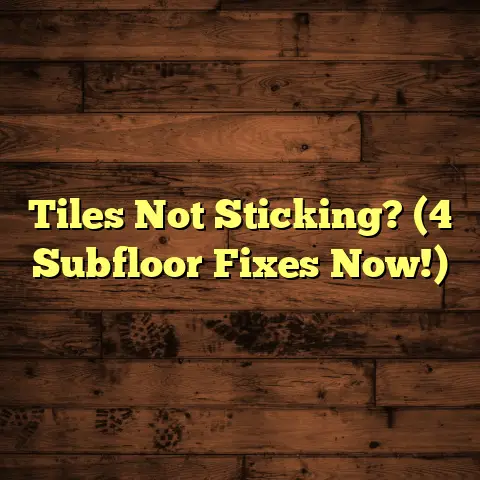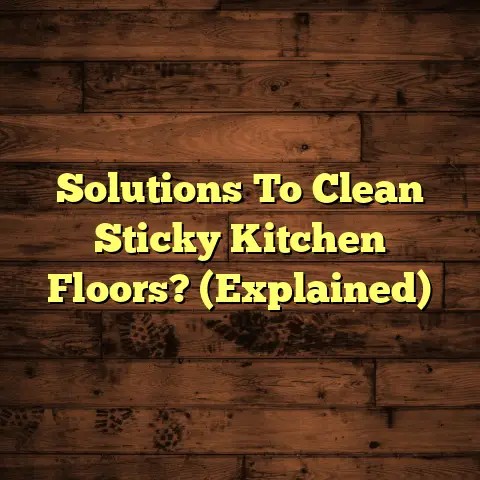Vinyl Basement Floor Cost? (1 Day Only!)
And guess what? Vinyl flooring is often the unsung hero of these transformations.
It’s affordable, looks great, and can handle the unique challenges that basements throw its way.
So, you’re probably wondering, “How much will this actually cost me?”
Let’s dive into the nitty-gritty of vinyl basement flooring costs, installation, and everything in between.
Understanding Vinyl Flooring
First things first, let’s talk about what vinyl flooring is. It’s a synthetic flooring option made primarily from PVC (polyvinyl chloride).
But don’t let that scare you off! Modern vinyl is a far cry from the old, thin sheets of the past.
We’ve got a few main types to consider:
-
Vinyl Sheets: These come in large rolls, offering a seamless look. They’re great for moisture resistance but can be tricky to install.
-
Luxury Vinyl Tiles (LVT): These are individual tiles that offer a more realistic look of stone or ceramic.
-
Luxury Vinyl Planks (LVP): These mimic hardwood planks and are super popular for their aesthetic appeal and ease of installation.
-
Waterproof Vinyl Flooring (WPC/SPC): These are typically planks or tiles that have a waterproof core, perfect for basements prone to dampness.
The beauty of vinyl is its layered construction. Typically, you’ll find a wear layer on top (protecting against scratches and stains), a design layer (giving it that wood or stone look), a core layer (providing stability), and sometimes an attached underlayment for added comfort and sound insulation.
Because of this construction, vinyl handles moisture incredibly well. Unlike hardwood, it won’t warp or rot if exposed to dampness, making it an ideal choice for basements.
Plus, the design options are endless! You can find vinyl that looks like anything from rustic hardwood to sleek slate, fitting any design style you can imagine.
Factors Influencing Cost of Vinyl Flooring
Okay, let’s get down to brass tacks: the cost. Several factors come into play when calculating the price of your vinyl basement flooring project.
-
Type of Vinyl: This is a big one. Standard vinyl sheets are generally the most affordable, while LVT and LVP tend to be more expensive, especially if you opt for higher-end brands with thicker wear layers. Waterproof options like WPC or SPC will also typically carry a higher price tag.
-
Thickness and Wear Layer: The thicker the vinyl and the thicker the wear layer, the more durable it will be. This translates to a higher price but also a longer lifespan. For basements, I usually recommend a wear layer of at least 12 mil (mils are thousandths of an inch).
-
Underlayment and Adhesive: Some vinyl flooring comes with an attached underlayment, which saves you money and hassle. If not, you’ll need to purchase it separately. The type of adhesive (if you’re going the glue-down route) also affects the cost. Use a high-quality adhesive specifically designed for vinyl flooring.
-
Local Market Conditions: Prices vary depending on where you live. Labor costs, material availability, and demand all play a role. Get quotes from multiple flooring contractors in your area to get a sense of the going rate.
Let’s look at a quick comparison:
| Type of Vinyl Flooring | Average Cost per Square Foot (Material Only) |
|---|---|
| Vinyl Sheet | \$1 – \$3 |
| Standard LVT/LVP | \$2 – \$5 |
| High-End LVT/LVP | \$5 – \$10+ |
| WPC/SPC | \$3 – \$7+ |
Note: These are just averages. Prices can fluctuate.
Cost Estimates for Vinyl Basement Flooring
Alright, let’s put some numbers to this. I’ll give you some ballpark estimates for different basement sizes. Keep in mind these are estimates, and your actual cost could vary.
Scenario 1: Small Basement (500 sq ft)
- Material (Mid-Range LVP at \$4/sq ft): \$2,000
- Underlayment (if needed): \$250
- Installation (Professional at \$3/sq ft): \$1,500
- Total: \$3,750
Scenario 2: Medium Basement (750 sq ft)
- Material (Mid-Range LVP at \$4/sq ft): \$3,000
- Underlayment (if needed): \$375
- Installation (Professional at \$3/sq ft): \$2,250
- Total: \$5,625
Scenario 3: Large Basement (1,000 sq ft)
- Material (Mid-Range LVP at \$4/sq ft): \$4,000
- Underlayment (if needed): \$500
- Installation (Professional at \$3/sq ft): \$3,000
- Total: \$7,500
DIY vs. Professional Installation:
If you’re handy, you can save a significant amount of money by installing the vinyl flooring yourself. However, be honest with yourself about your skill level and the time commitment involved.
A poorly installed floor can lead to problems down the road, costing you even more in the long run.
Here’s a quick breakdown:
-
DIY: Save on labor costs (typically \$2-\$5 per sq ft), but you’ll need to buy or rent tools and invest your time.
-
Professional: Higher upfront cost, but you get the peace of mind knowing the job is done correctly and often comes with a warranty.
Installation Process and Timeline
So, you’ve chosen your vinyl and you’re ready to install. Here’s a step-by-step overview of the process:
-
Preparation is Key: This is crucial. The basement floor needs to be clean, level, and dry. Remove any existing flooring, sweep, and vacuum thoroughly.
-
Leveling the Floor: If your basement floor has any unevenness, you’ll need to level it. Use a self-leveling compound to fill in any dips or cracks.
-
Moisture Barrier: Basements are prone to moisture, so a moisture barrier is essential. This is typically a plastic sheet that you lay over the concrete floor.
-
Underlayment (if needed): If your vinyl flooring doesn’t have an attached underlayment, install it now. This will provide extra cushion and sound insulation.
-
Installation: Depending on the type of vinyl you’ve chosen, you’ll either glue it down or use a click-lock system.
- Glue-Down: Apply adhesive to the floor in sections and carefully lay the vinyl sheets or tiles.
- Click-Lock: Simply click the planks or tiles together, creating a floating floor.
-
Finishing Touches: Install baseboards and trim to give the floor a finished look.
Can it be done in a day?
Potentially, yes! For a small basement (500 sq ft) and a simple click-lock installation, a single day is achievable, especially if you have help.
However, larger basements or more complex installations (like glue-down) will likely take longer.
Tools and Materials:
- Measuring tape
- Utility knife
- Straight edge
- Tapping block
- Rubber mallet
- Adhesive (if needed)
- Moisture meter
- Self-leveling compound (if needed)
- Moisture barrier
Maintenance and Longevity
One of the best things about vinyl flooring is its low maintenance. Here’s what you need to know to keep it looking its best:
-
Regular Cleaning: Sweep or vacuum regularly to remove dirt and debris.
-
Damp Mopping: Use a damp mop with a mild detergent to clean the floor. Avoid harsh chemicals or abrasive cleaners.
-
Protect from Scratches: Use furniture pads under heavy furniture to prevent scratches.
-
Avoid Excessive Moisture: While vinyl is water-resistant, it’s not waterproof. Clean up spills promptly to prevent water from seeping under the flooring.
With proper care, vinyl flooring can last for 10-20 years or even longer in a basement environment.
Factors that can affect its longevity include the quality of the vinyl, the amount of foot traffic, and the presence of moisture.
Real-Life Case Studies
I’ve seen countless homeowners transform their basements with vinyl flooring. Here are a couple of examples:
Case Study 1: The Jones Family
The Jones family had a damp, unfinished basement that they wanted to turn into a playroom for their kids. They chose a waterproof LVP with a wood-look finish.
They hired a professional installer, and the project took two days. They were thrilled with the result! The vinyl flooring was durable, easy to clean, and created a warm and inviting space for their children.
Case Study 2: The Smith Family
The Smith family decided to tackle their basement flooring project themselves. They chose a click-lock LVT that mimicked the look of ceramic tile.
It took them a weekend to install, but they saved a significant amount of money on labor costs. They were proud of their DIY project and loved the updated look of their basement.
These are just a couple of examples, but they illustrate the versatility and affordability of vinyl flooring for basements.
Conclusion
So, what’s the verdict? Is vinyl flooring a good choice for your basement?
In my opinion, absolutely! It’s a cost-effective, durable, and stylish option that can transform your basement into a comfortable and functional living space.
Remember to consider your specific needs and budget when choosing the right type of vinyl flooring.
Think about the level of moisture in your basement, the amount of foot traffic, and your desired aesthetic.
By carefully considering these factors, you can choose a vinyl flooring option that will provide years of enjoyment.
Call to Action
I hope this article has been helpful! I know flooring can be overwhelming.
Have you had experience with vinyl basement flooring? Share your thoughts and tips in the comments below!
Or, if you have any questions, don’t hesitate to ask. I’m here to help you make the best decision for your home.





